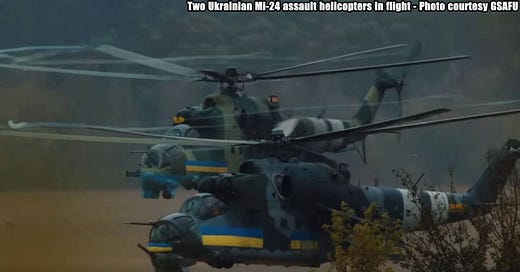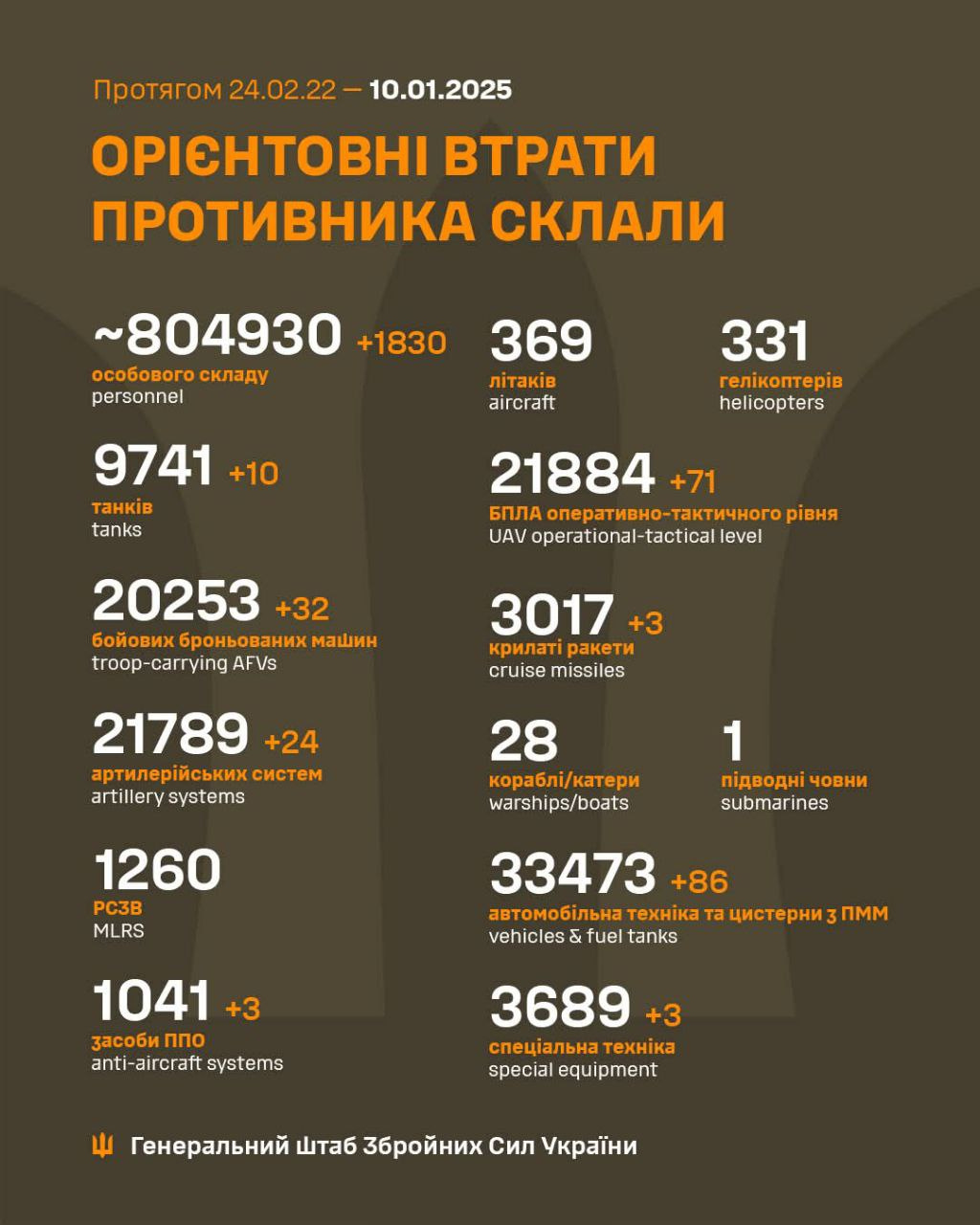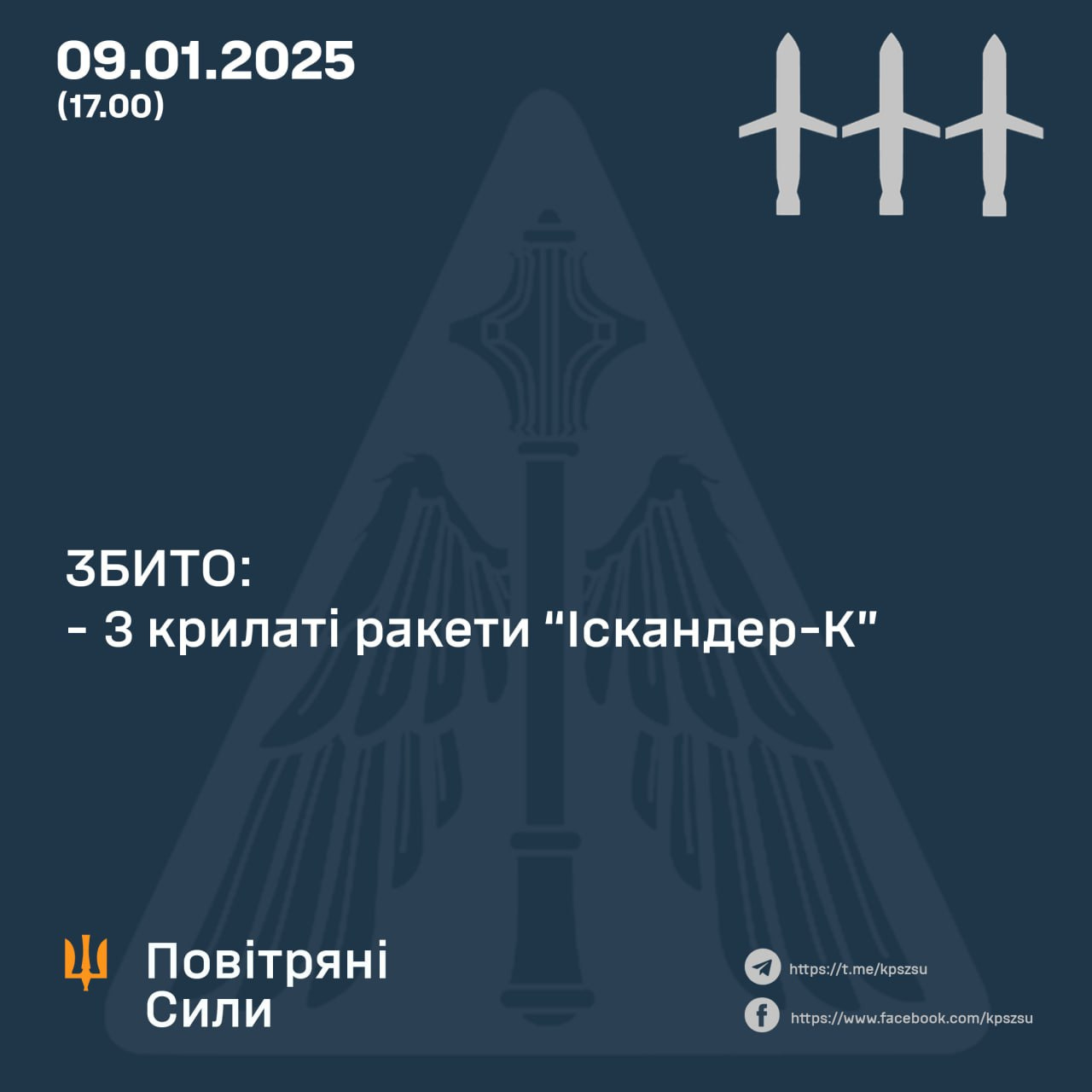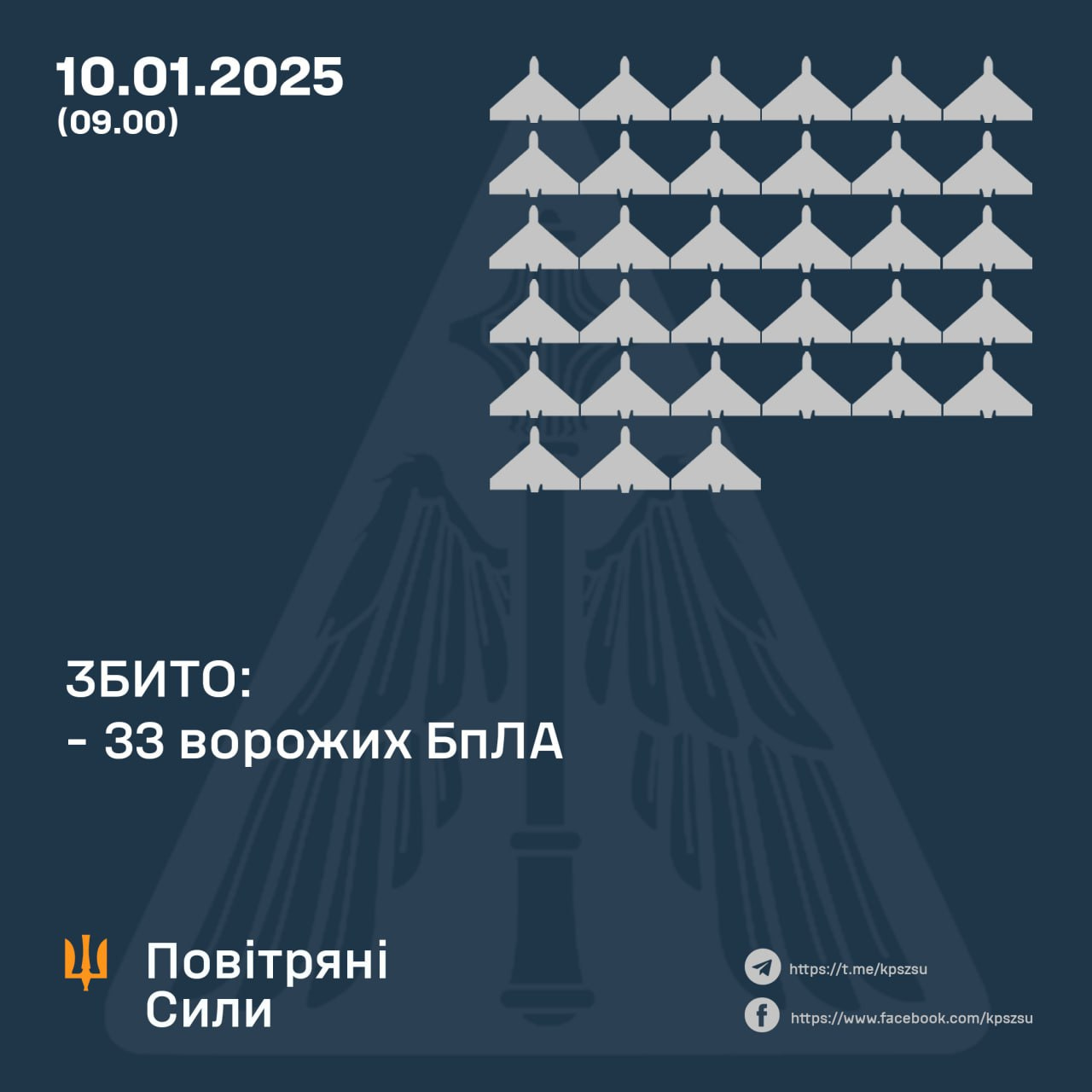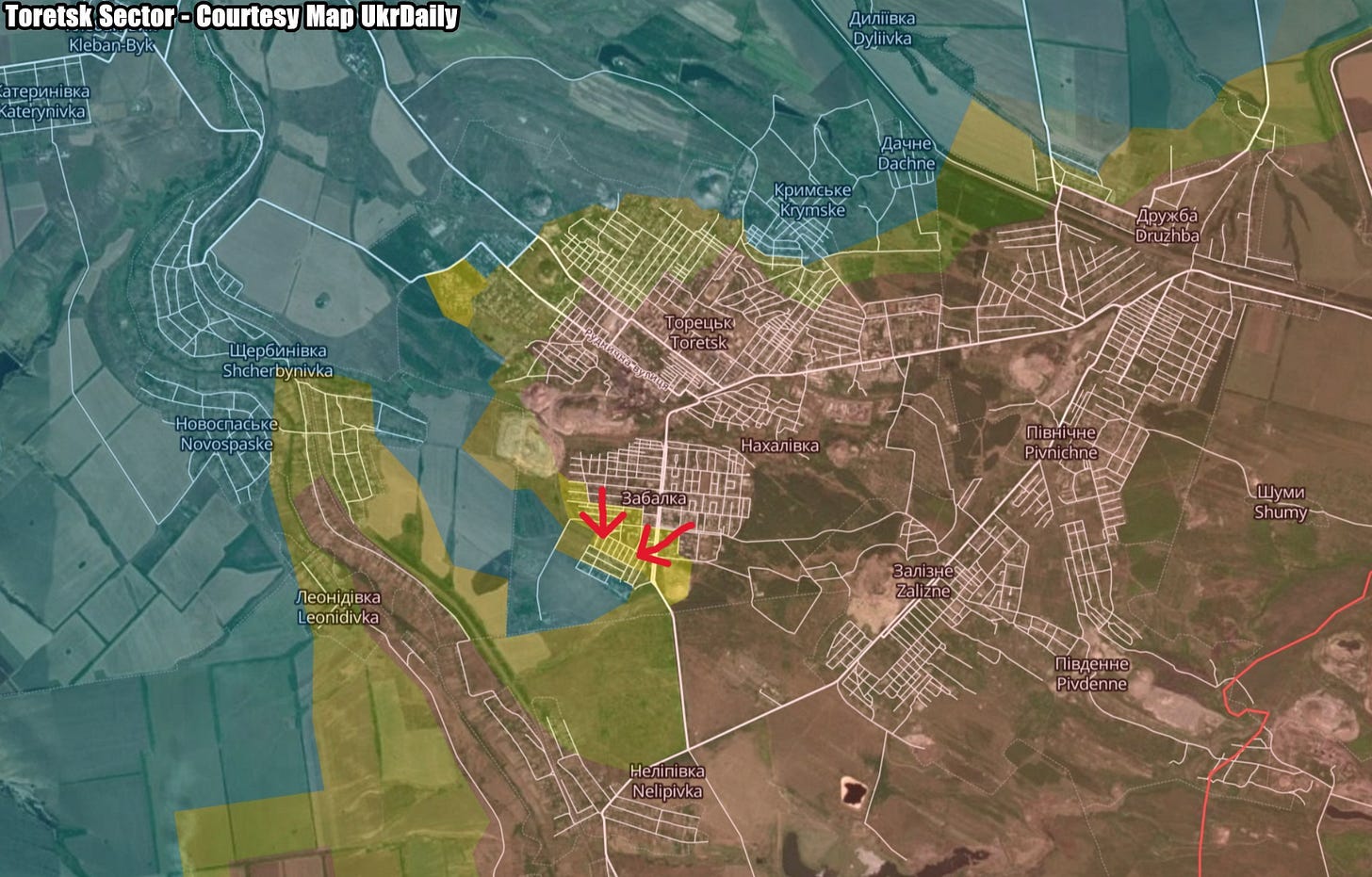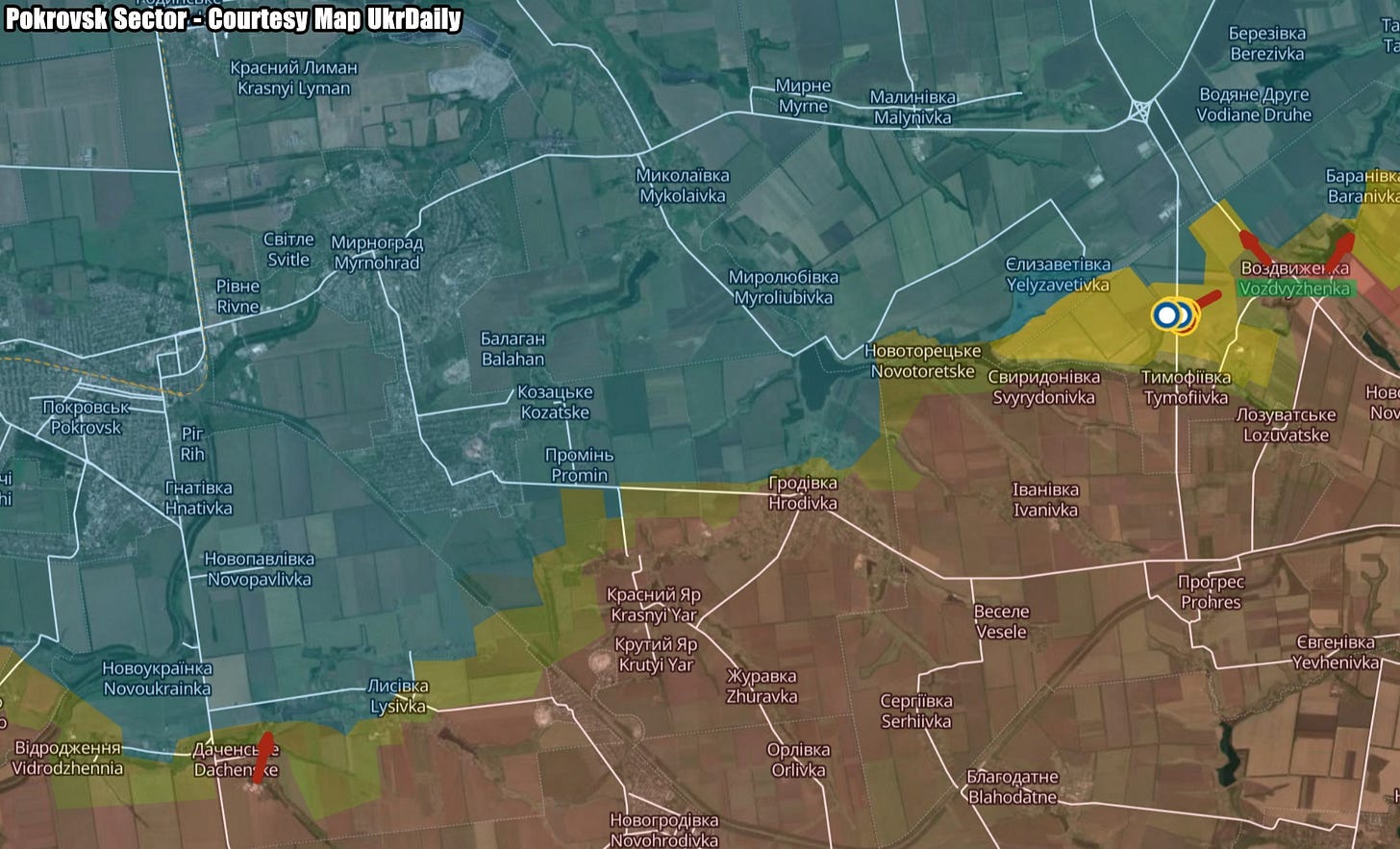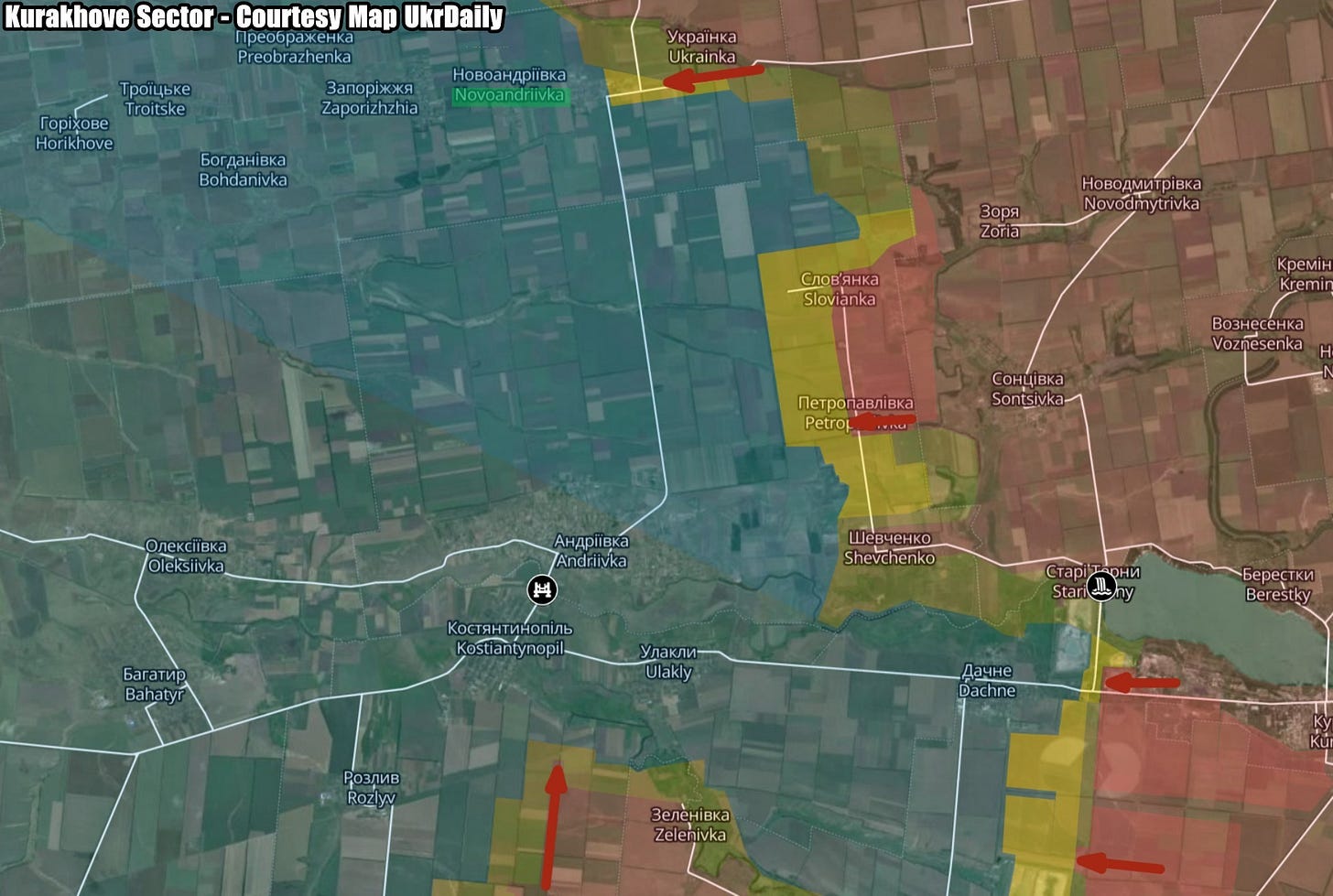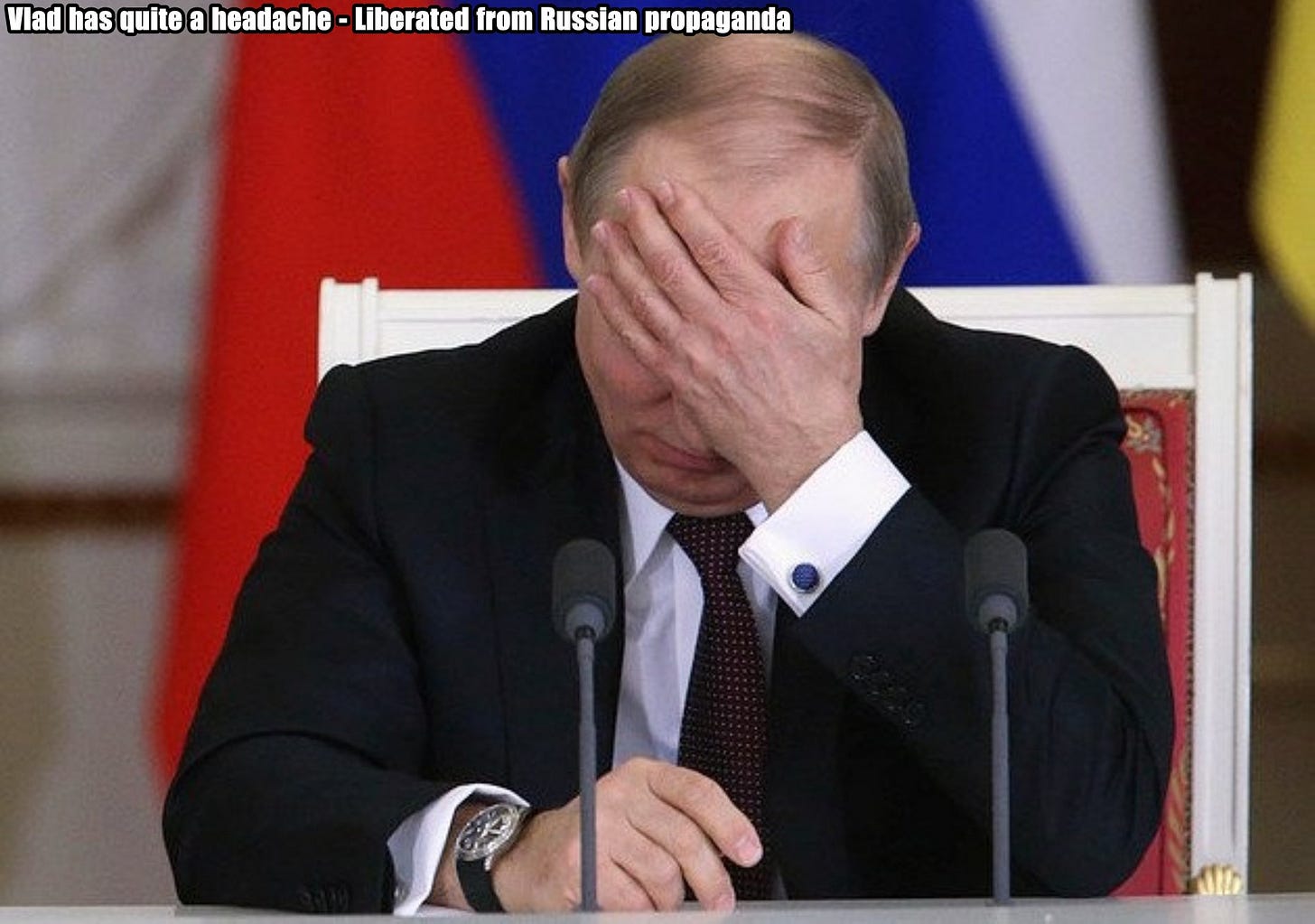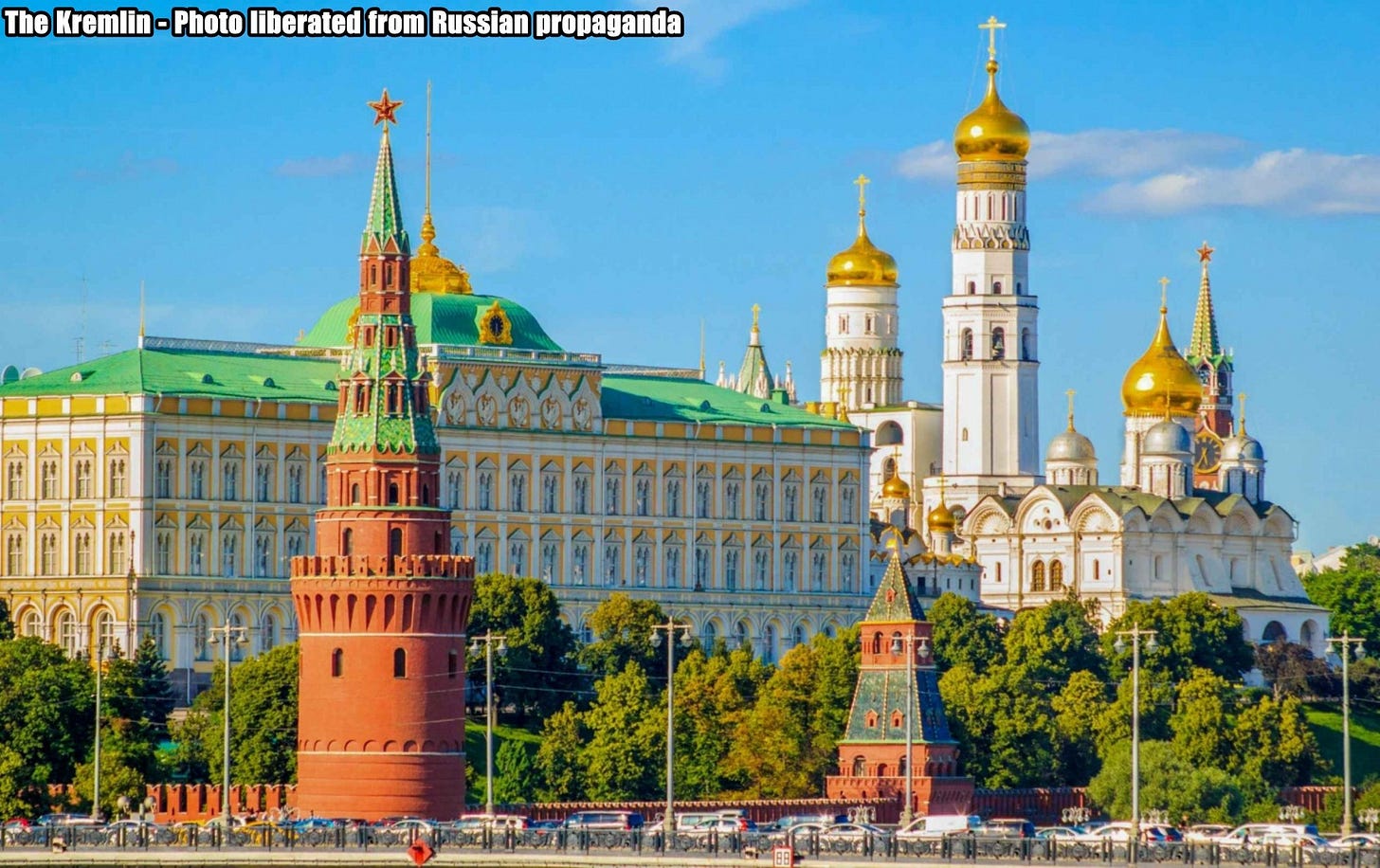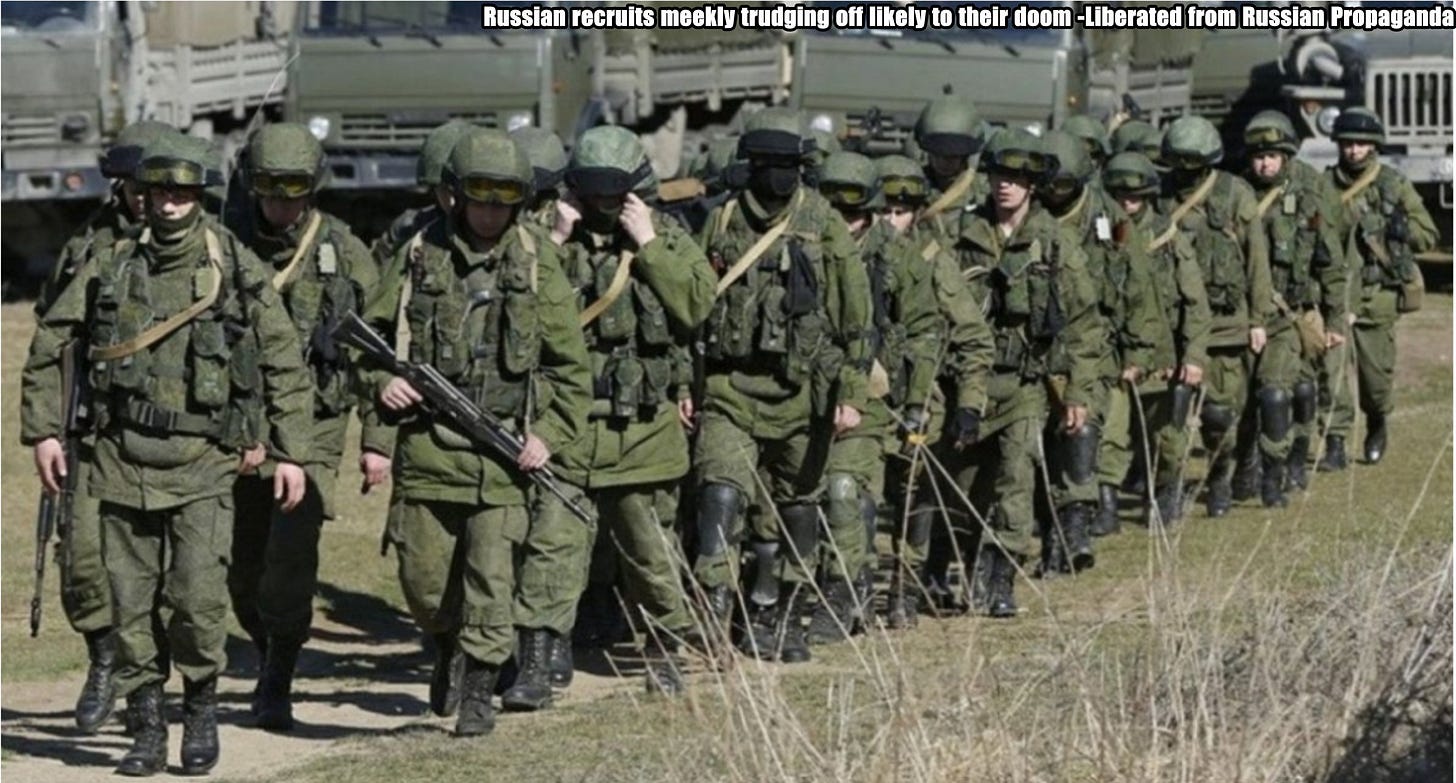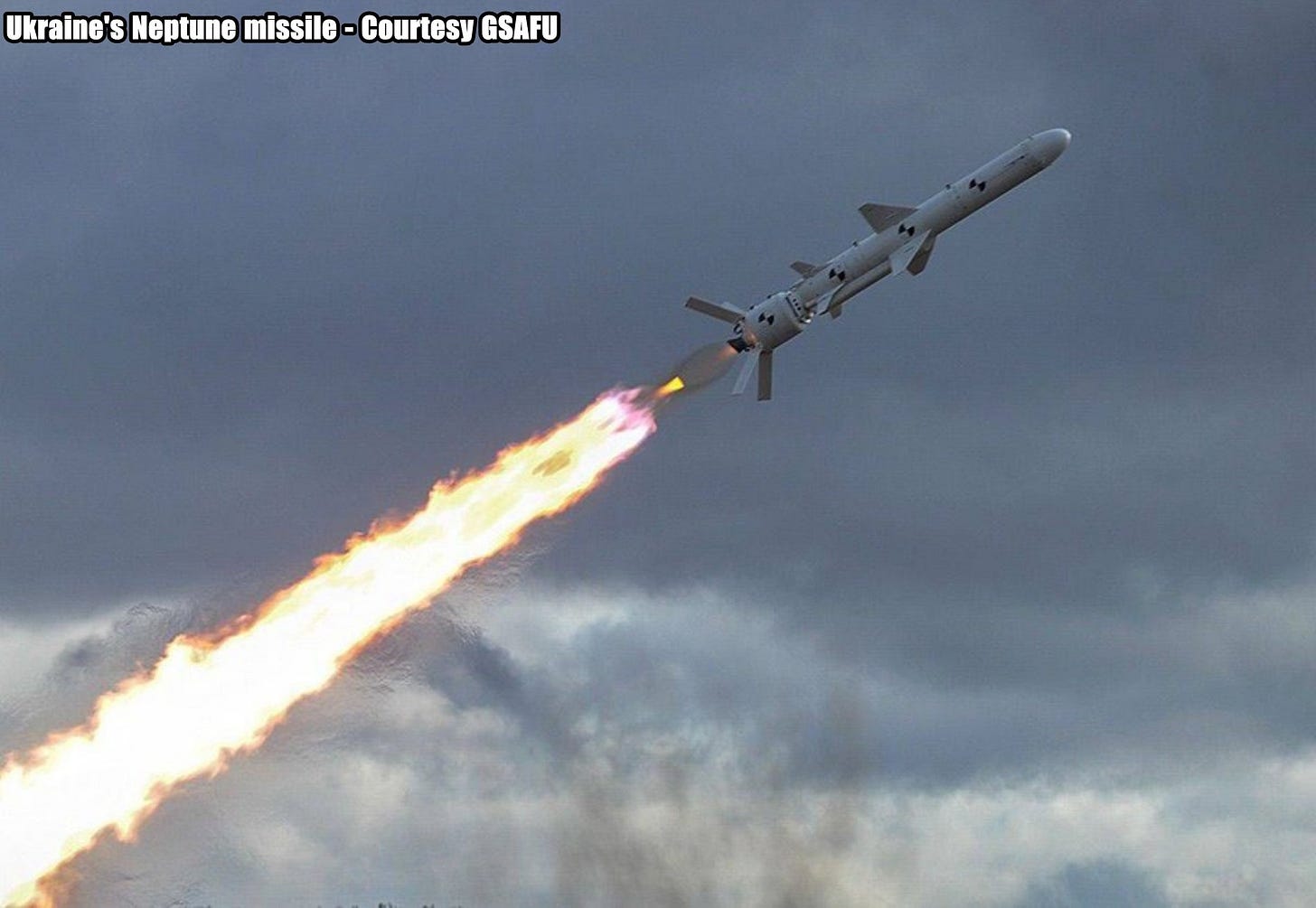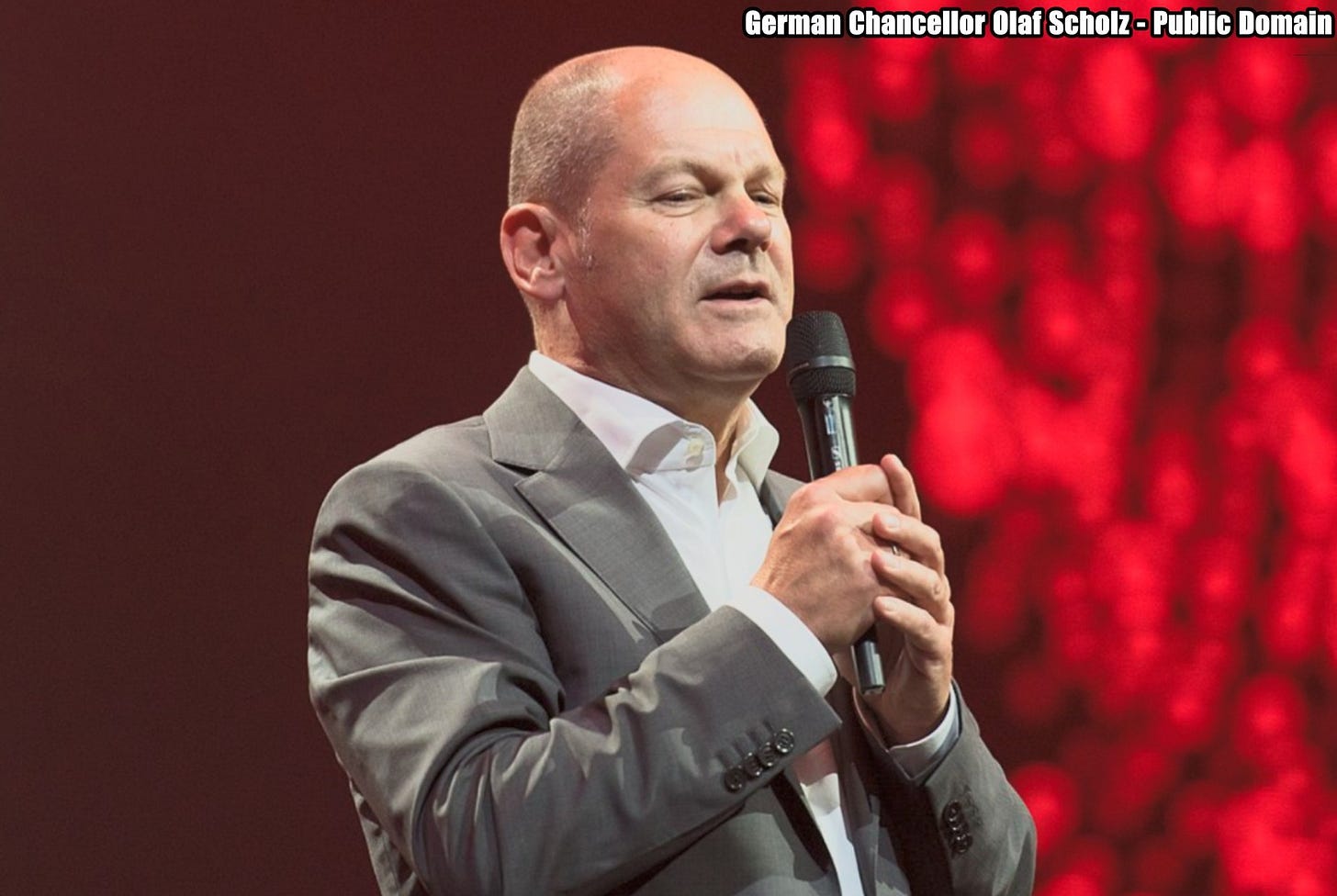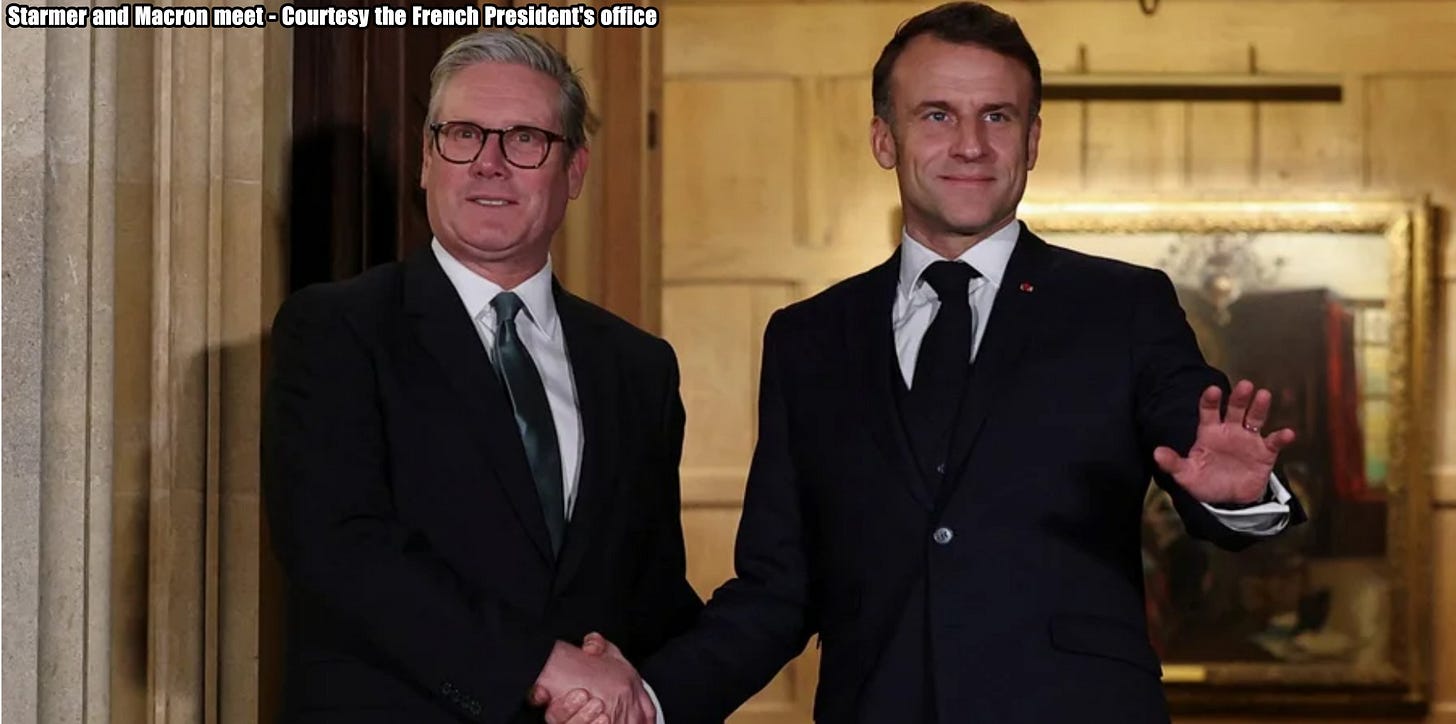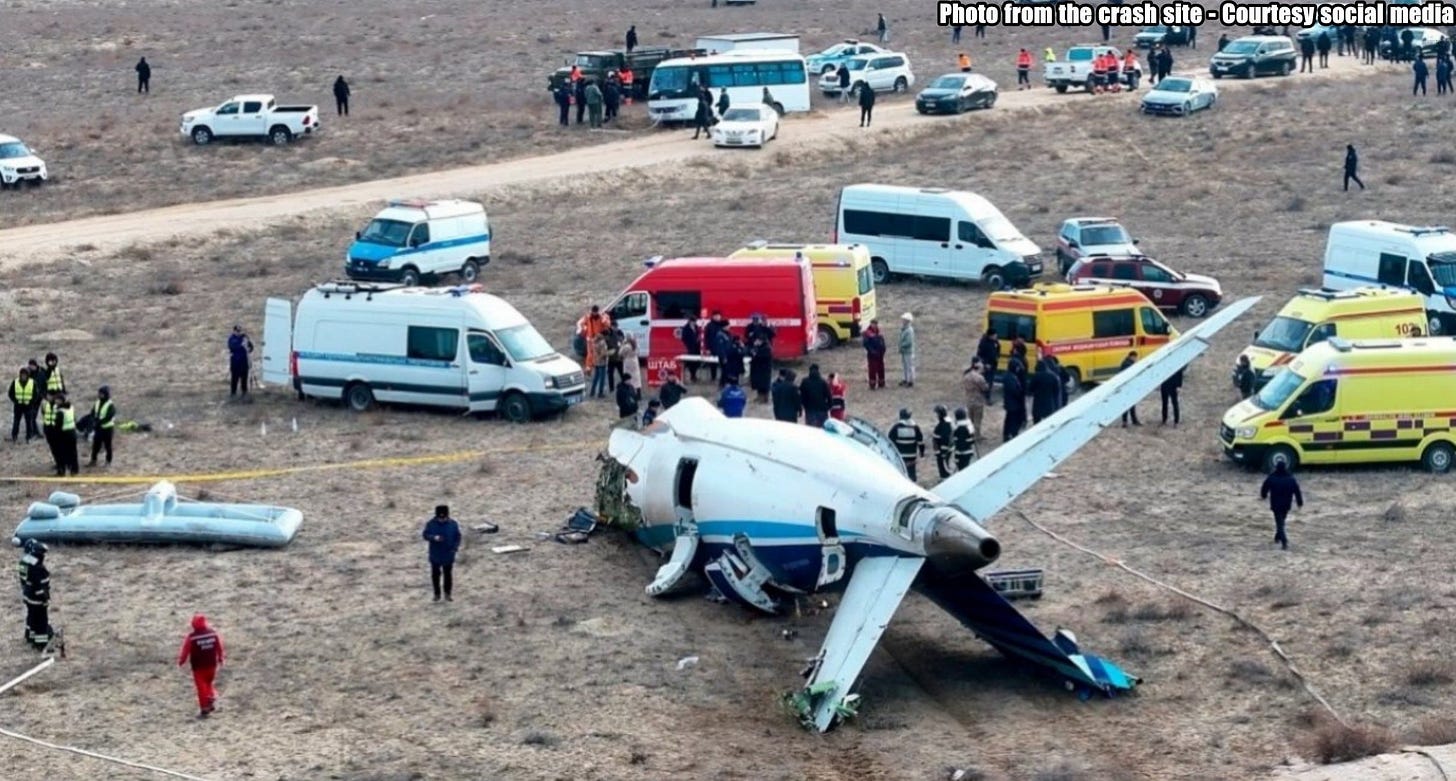Slava Ukraini! In early 2022 I began a Telegram channel aggregating news from a number of sources daily on the war in Ukraine. In June 2023 I began providing a daily draft for the Ukraine War Brief Podcast collecting news from over 70 sources daily, which formed the basis of the script. While the Podcast no longer exists I have continued to make this Brief available for my followers here on Substack for those who wish to keep up with the news from the war.
All the latest news on the Russo-Ukraine War 6 days per week
ALONG THE CONTACT LINE
GSAFU Morning Report
The General Staff of the Armed Forces of Ukraine in its Operational Information update at 08:00 on Jan 10 stated that day 1052 of the full-scale invasion of the Russian Federation against Ukraine had begun.
The situation on the line of combat remains tense in some sectors. Ukrainian defenders continue to actively counteract the Russian aggressor, causing them losses in personnel equipment and technology. Exhausting the enemy along the entire front line and continuing to disrupt the plans of Russian occupiers to advance deeper into the territory of Ukraine.
During the past day, 161 combat engagements took place. Over the past 24 hours, the enemy carried out 1 missile strike, 55 air strikes, used more than 2,408 drones and more than 6,000 artillery strikes across the positions of Ukrainian forces and civilians.
Air Force Daily Report
At 14:10 on January 9, 2025, the enemy attacked the city of Kryvyi Rih with three ground-based Iskander-K cruise missiles. All three missiles were shot down by units of the "East" air command of the Air Force of the Armed Forces of Ukraine.
33 ENEMY UAVS WERE SHOT, 34 DRONES DID NOT REACH THEIR TARGETS (LOCATIONALLY LOST)
➖➖➖➖➖➖➖➖➖
On the night of January 10, 2025 (from 8:30 p.m. on January 9), the enemy attacked with 72 Shahed attack UAVs and simulator drones of various types from the directions of Millerovo, Orel, Bryansk, Primorsko-Akhtarsk - Russia.
The air attack was repelled by aviation, anti-aircraft missile troops, electronic warfare units, and mobile fire groups of the Air Force and Defense Forces of Ukraine.
As of 09:00, it was confirmed that 33 Shahed attack UAVs and drones of other types were shot down in Poltava, Sumy, Kharkiv, Cherkasy, Chernihiv, Kyiv, Dnipropetrovsk, Zaporizhia, Khmelnytskyi, Vinnytsia and Kherson regions.
Five UAV hits (enterprises and outbuildings) were recorded in the frontline area in the north of Chernihiv region, a civilian was injured. In Kyiv region, a hit UAV fell on a high-rise building, damaging a building and two dozen cars. Previously, there were no casualties.
34 enemy drones-simulators were lost in location (without negative consequences), one of them flew towards the Russian Federation.
Ukrainian Operations in the Russian Federation
The Institute for the Study of War (ISW), a US based think tank, in its Jan 9 Russian Offensive Campaign Assessment reported that Russian forces recently intensified offensive operations aimed at retaking the remainder of Kursk Oblast and advanced during a reinforced battalion-sized mechanized assault northwest of Sudzha on Jan 9. Geolocated footage published by a Ukrainian brigade operating in Kursk Oblast on Jan 9 indicates that Russian forces seized Leonidovo and Aleksandriya and advanced northwest of Nikolskyi and west of Vikotorovka (all northwest of Sudzha) during a reinforced battalion-sized mechanized assault.
The Ukrainian brigade that repelled the attack reported that Russian forces conducted the assault in six waves and that Russian forces used 50 tanks, infantry fighting vehicles (IFVs), armored personnel carriers (APCs), and civilian vehicles in the attack.The brigade reported that it destroyed an unspecified number of Russian vehicles during the assault. Additional geolocated footage published on Jan 8 and 9 indicates that Russian forces advanced in Pogrebki (northeast of Sudzha at the northernmost point of the Ukrainian salient) and marginally advanced in Makhnovka (east of Sudzha). Russian milbloggers claimed that Russian forces seized Pogrebki and advanced further south, but ISW has not observed confirmation of these more maximalist claims.
Russian milbloggers claimed that Russian forces are attacking throughout the salient, including near Sudzha itself; northeast of Sudzha near Staraya Sorochina; northeast of Sudzha near Russkoye Porechnoye and Cherkasskoye Porechnoye; east of Sudzha near Bondarevka and Makhnovka; and southeast of Sudzha near Guyevo and Kurilovka. Russian forces reintensified assaults in Kursk Oblast on Jan 5 and have conducted assaults throughout the salient over the last four days after mainly focusing on advancing east of Sudzha in recent months.
Ukrainian forces recently advanced northwest of Sudzha. Geolocated footage published on Jan 9 indicates that Ukrainian forces recently advanced in western Nikolayevka (further northwest of Sudzha). Russian milbloggers claimed that Ukrainian forces are counterattacking near Pogrebki, Novaya Sorochina (northwest of Sudzha), Staraya Sorochina, and Nikolayevka.
The Khortytsia operational-strategic group
(Responsible for the northeastern part of Ukraine. )
Toretsk Sector: Over the last day Russian forces advanced marginally south of Toretsk.
The Tavria operational-strategic group
(Responsible for the central-eastern and southeastern part of Ukraine.)
Pokrovsk Sector : During the last day there have been 37 combat engagements in this sector. Russian forces advanced marginally south and west of Vozdvyzhenka where they faced heavy Ukrainian shelling.
Kurakhove Sector: There have been 23 combat engagements in this sector during the last day. Russian forces advanced marginally southwest of Ukrainka towards Novoandriivka.
The Odesa operational-strategic group
(Responsible for Kherson, Qırım, (also known as Crimea) and the Black Sea.)
There have been no major changes to the combat environment since our last report.
TEMPORARILY OCCUPIED TERRITORIES
Nothing major to report.
THE HOME FRONT
PM warns - Halting Russian oil transit through Ukraine risks major international fines
Stopping the transit of Russian oil through Ukraine to European countries would violate the Energy Charter Treaty and the EU Association Agreement and could result in penalties, Ukrainian Prime Minister Denys Shmyhal warned during a government Q&A session in Parliament on Jan. 10. New Voice reported.
“The transit of oil through Ukraine is carried out in accordance with the provisions of the Energy Charter Treaty and the EU Association Agreement on ensuring transit freedom. It also complies with the conditions of the EU’s sixth package of sanctions,” Shmyhal stated.
He emphasized that halting the transit of Russian oil through the Druzhba pipeline would directly breach these agreements.
“A violation of Ukraine’s international obligations regarding transit security could provide grounds for holding Ukraine accountable for disrupting the reliable and uninterrupted transit of oil. This could lead to claims from Hungary, Slovakia, and the Czech Republic, with the potential for significant financial demands,” Shmyhal explained. He added, “This would lead to international arbitration, and the financial penalties would depend on the claims from affected countries. These will undoubtedly be significant sums.”
Earlier, a draft law (No. 12380) proposing a ban on the transit of Russian oil and gas through Ukrainian territory during wartime was registered in the Verkhovna Rada.
On Jan. 1, 2025, the transit agreement between Gazprom and Naftogaz expired, prompting Ukraine to halt the transit of Russian gas through its territory.
RUSSIAN WORLD
High ranking Russians reportedly frustrated with Putin’s plan for War in Ukraine.
The Institute for the Study of War (ISW), a US based think tank, in its -- Russian Offensive Campaign Assessment reported that Russian elites and high-ranking security officials are reportedly frustrated with Russian President Vladimir Putin's efforts to wage a full-scale war in Ukraine with half measures and are increasingly concerned with Putin's timeline to end the war. Sources in the Russian presidential administration, State Duma, and wider Russian federal government and regional governments told Russian opposition media outlet Meduza that Russian elites are increasingly "disappointed" and "tired" of waiting for the war to end and are growing increasingly concerned about the long-term impact of Western sanctions on Russia's economy. Two sources close to the presidential administration noted that the Russian government currently lacks a clear vision for post-war Russia and that an end to the war could be "critical" for the presidential administration if the administration cannot identify a clear narrative and political framework for Russian society after the war. A source in the Russian presidential administration told Meduza that Russian elites, primarily high-ranking security officials, are increasingly frustrated with not having "enough" manpower and materiel to conduct the war and assess that Putin needs to conduct "mobilization" and completely transition Russian society and the Russian economy to a wartime footing.
High-ranking Russian security officials appear to be assessing that Russia needs to intensify its war in Ukraine rather than seek an exit via negotiations. Meduza's report suggests that Russian security and military officials may recognize that the Russian military is not accomplishing significant territorial gains proportionate to the manpower and materiel losses they are incurring in Ukraine.
The Russian military command has, thus far, tolerated taking exorbitant personnel losses in exchange for tactically but not operationally significant advances, and Putin's theory of victory is predicated on accepting such losses so long as Russian forces continue to grind forward in Ukraine. Average daily Russian advances slowed by roughly nine square kilometers in December 2024 after three straight months of increasing territorial gains and personnel losses in September, October, and November 2024, however, and the Russian military command may be less willing than Putin to incur such high casualty rates if Russian forces' rate of advance continues to slow. Russian security and military officials do not appear prepared to abandon the war as a result of these losses, however, but are reportedly instead advocating for Putin to intensify Russia's war effort by calling for additional partial reserve callups and a formal decision to transition to a wartime footing, likely in hopes of flooding the battlefield with manpower and materiel. ISW continues to assess that Putin is resistant to conducting a partial involuntary reserve callup or further mobilizing the Russian economy, as such decisions would be deeply unpopular among Russians and would further strain Russia's labor shortages and economy. It remains unclear if this group of Russian security and military officials calling for further manpower and economic mobilization will succeed in convincing Putin to take more dramatic measures to meet the Russian military's needs in Ukraine, although mounting personnel losses and increasing challenges in meeting voluntary recruitment targets may cause Putin to conduct an involuntary partial reserve callup in the near future.
ISW assesses that Russian elites' reported diagnosis of the main problem with Russia's conduct of the war is inaccurate, as Russia's failure to restore maneuver to the battlefield — not a shortage of manpower — is the main factor causing Russia's relatively slow rate of advance. Russian elites' reported focus on mobilizing more Russian personnel indicates that the Russian elites likely view a lack of manpower as Russia's largest constraint to achieving rapid success on the battlefield rather than the ineffectiveness of frontline Russian forces, poor campaign-planning abilities of Russian commanders, and significant armored vehicle shortages that Russian forces are currently suffering. Russian forces have recently demonstrated that they are able to make slow, grinding gains through infantry assaults in the Pokrovsk and Kurakhove directions, but their inability to conduct rapid, mechanized maneuver has prevented Russian forces from converting these tactical gains into deep penetrations into Ukrainian rear areas.
Both Russian and Ukrainian forces are struggling to restore maneuver to an increasingly transparent battlefield, but the Russian military will also have to address critical shortcomings in its ability to train frontline commanders and plan military operations if Russian forces aspire to conduct the type of rapid, mechanized maneuver that characterized the first few months of the full-scale invasion in early 2022.
Ukrainian military officials recently reported that Russian forces are fielding fewer armored vehicles in the Pokrovsk and Kurakhove directions — the two operational directions with the highest intensity of fighting and where Russia has the densest concentrations of its forces — in favor of highly attritional, infantry-led assaults. Russian forces have suffered high and unsustainable armored vehicle losses and have struggled to protect these vehicles from Ukrainian drones on the frontline over the last year, forcing Russian forces to increasingly limit and prioritize where and when to field armored vehicles and conduct mechanized assaults. Dedicating a significant amount of additional Russian manpower to infantry assaults on critical areas of the frontline would likely allow Russian forces to at least sustain or possibly slightly increase their current pace of advance, but only as fast as Russian infantry can travel on foot — far short of the rapid gains, deep penetrations, and significant battlefield victories that the Russian elites likely desire.
Meduza's report indicates that Russia's security elite — like Putin himself — is uninterested in a negotiated and peaceful resolution to the war in the near future. Several sources told Meduza that Russian elites were concerned about Putin's ability to extract his territorial demands — the formal recognition of Russian control over the entirety of Donetsk, Luhansk, Kherson, and Zaporizhia oblasts, including the parts Russia currently does not occupy — in possible future negotiations and are focused on creating an "image of victory" in post-war Russia.
This focus on Russian victory in tandem with the elites' reported desire to intensify the war further indicates that Russian elites support Putin's desire to negotiate only on terms dictated by Russia and to achieve a significant victory to justify the war to Russian society. Putin and other senior Kremlin officials have repeatedly indicated that Russia is unwilling to engage in good-faith negotiations or participate in a meaningful peace negotiation except on terms that amount to Ukraine's full capitulation, and the Russian elite will most likely continue to support Putin's demands over engaging in meaningful negotiations.
Ukrainian Neptune missile hits Russian drone warehouse in Rostov Oblast.
Ukraine struck a Russian warehouse storing ammunition and reconnaissance drones using a domestically-made Neptune missile overnight on Jan. 10, The Kyiv Independent reported citing a source in the Security Service of Ukraine (SBU).
According to the source, the attack near the village of Chaltyr in Russia's Rostov Oblast was carried out by the SBU and Ukraine's Navy.
At first, Ukrainian drones reportedly "overloaded" Russian air defenses, with a Neptune missile hitting the site shortly after, the source said.
Videos published on social media show the moment of an explosion in Rostov Oblast and a tall column of smoke rising over the settlement.
The extent of the damage was not disclosed. The Kyiv Independent could not verify the claims.
Earlier on Jan. 10, local authorities and Russian independent media reported that Ukrainian drones had attacked several Russian oblasts overnight, causing severe fires in Leningrad and Rostov oblasts.
Neptune is Ukraine’s ground-launched, domestically produced anti-ship rocket with a maximum range of 300 kilometers.
Ukrainian forces reportedly used Neptune missiles to destroy a Russian S-400 Triumph air defense system on Sept. 14 and sink Russia’s Black Sea flagship Moskva in April 2022.
The attack is one of several recent strikes in Rostov Oblast. On Dec. 25, Ukrainian long-range drones targeted an ammunition depot at the Kadamovsky military training ground, a source in the SBU told the Kyiv Independent.
A day later, Ukraine's Center for Strategic Communications (Stratcom) reported that the Armed Forces struck a plant in Rostov Oblast, that produces solid propellant for ballistic missiles.
INTERNATIONAL NEWS
Scholz blocks proposal for $3 billion arms package for Ukraine
German Chancellor Olaf Scholz blocked a proposal for an additional €3 billion aid package for weapons to Ukraine, Politico reports citing an article in Spiegel.
The plan, revealed by Spiegel, was introduced by Foreign Minister Annalena Baerbock of the Greens and Defense Minister Boris Pistorius from Scholz’s Social Democratic Party. It sought to provide Ukraine with critical weapons systems, including three additional Iris-T air defense batteries, 10 howitzers and more artillery ammunition.
According to the report, the aid package was developed immediately following the collapse of the coalition government in November, with Baerbock and Pistorius aiming to secure parliamentary approval for the funding before February's snap federal elections.
Their ministries had justified the request by citing Ukraine's deteriorating military situation, compounded by doubts over continued U.S. support following Donald Trump’s election victory. Baerbock and Pistorius framed the proposal as a vital signal of Germany’s unwavering support.
Despite their efforts, Scholz remained opposed. The incumbent chancellor reportedly argued that existing military aid allocations — €4 billion for 2025, alongside funds from a $50 billion G7 loan financed by frozen Russian assets — are sufficient. He expressed concern over committing the incoming government to major financial obligations after the election.
Political considerations also loom large. The SPD leader is said to fear alienating voters with additional arms deliveries amid a contentious election campaign season. By contrast, the Greens have sought to leverage their support for increased defense spending as an electoral asset.
Despite the blockade, Pistorius reaffirmed Germany’s broader commitments during the Ukraine Defense Contact Group meeting at the U.S. Air Base in Ramstein on Thursday. He announced that Germany will supply around 50 guided missiles for IRIS-T air defense systems, originally intended for the Bundeswehr but redirected to Ukraine directly from production.
“We will supply Ukraine first before replenishing our own stocks,” Pistorius said, assuring that Ukraine could still rely on Germany, regardless of the outcome of the upcoming election.
Macron and Starmer hold talks on arms supplies, security guarantees for Ukraine
French President Emmanuel Macron and British Prime Minister Keir Starmer met on Jan 10, at the British leader's country residence, Chequers, to discuss the situation in Ukraine, among other topics, New Voice reports citing a statement from the French President’s office.
The meeting focused on international goals, the situation in Ukraine, the Middle East, strengthening relations between the United Kingdom and the European Union, and deepening Franco-British relations ahead of the upcoming summer summit.
"The situation in Ukraine was at the center of the discussions," the communique reads.
“Both leaders reaffirmed their commitment to close coordination in supporting Ukraine for as long as necessary. They emphasized the importance of continuing to provide the necessary equipment for the defense of Ukrainian territory and ensuring stable financial support for Ukraine beyond 2025.”
The parties also stressed the importance of providing security guarantees to Ukraine to protect it from further aggression in the future.
The Élysée Palace noted that the next Franco-British summit would be an opportunity to deepen cooperation in defense, energy transition, artificial intelligence, migration, and cultural exchanges.
New US sanctions on Russian tankers to hit oil supplies to India, refining sources say
Indian firms see a major disruption of Russian oil supplies as Washington imposes new sanctions to curb Moscow's revenues, pushing refiners to scout for crude from the Middle East and the U.S., Reuters reported citing three Indian refining sources said on Friday.
The sources said they understand that the new U.S. sanctions would target more than 180 tankers shipping Russian oil and Russia-based maritime insurance service providers Ingosstrakh Insurance Company and Alfastrakhovanie Group.
EU issues new alert for planes flying in Russian airspace
The EU's aviation safety watchdog on Jan. 9 issued a new alert advising non-European airlines to avoid flying over western Russia following the downing of an Azerbaijan Airlines plane last month.
The crash, which killed 38 people, is believed to have been caused by Russian air defenses firing at Ukrainian drones.
"The ongoing conflict following the Russian invasion of Ukraine poses the risk of civil aircraft being unintentionally targeted in the airspace of the Russian Federation due to possible civil-military coordination deficiencies, and the potential for misidentification," the European Union Aviation Safety Agency (EASA) said.
"EASA recommends not to operate within the affected airspace of the Russian Federation located west of longitude 60° East at all altitudes and flight levels."
Russian airspace is already closed to EU airlines. The alert applies to third-country operators authorised by EASA.
The Azerbaijan Airlines plane, en route from Baku to Grozny, Chechnya, changed course and crashed in Kazakhstan on Dec. 25.
Multiple reports and official Azerbaijani statements attributed the disaster to a missile launched by a Russian Pantsir-S air defense system.
Russian President Vladimir Putin, who has maintained close ties with Azerbaijan, offered condolences during a Dec. 28 phone call but stopped short of admitting Russian responsibility.
Azerbaijani President Ilham Aliyev criticized Russia’s handling of the incident, accusing its agencies of suppressing evidence and promoting "absurd versions" of events.
Aliyev also blamed Russia for failing to close its airspace near Grozny and highlighted poor coordination between its military and civil aviation services as factors contributing to the tragedy.
Japan Expands Russia Sanctions With Fresh Asset Freezes, Export Bans
Japan on Friday announced asset freezes for dozens of individuals and entities, as well as sweeping export bans, as part of sanctions against Russia over its invasion of Ukraine. The Moscow Times reports.
Tokyo’s asset freeze list expanded to 11 Russian executives and one North Korean, as well as 29 military-related groups, three Russian banks and one Georgian bank. They are all accused of helping Moscow evade sanctions, with Japan’s Foreign Ministry saying the bank assets will be frozen on Feb. 9.
Tokyo also banned exports for 22 military-related companies from Russia, as well as 31 non-Russian entities accused of sanctions evasion.
Eleven of the foreign companies are based in Hong Kong, eight in Turkey, seven in mainland China, two in Kyrgyzstan and one each in Thailand, the United Arab Emirates and Kazakhstan.
The export bans go into effect from Jan. 17 to Jan. 23, according to Japan’s Ministry of Economy, Trade and Industry.
Japan also updated its list of goods banned from being exported to Russia to 335 items, including motorcycles, acoustic equipment, construction vehicle engines and cranes. Those export bans go into effect on Jan. 23.
The measures are part of Japan’s commitment toward the G7’s agreement to “starve Russia of G7 technology, industrial equipment and services that support its war machine.”
Tokyo has already frozen the assets of Russian individuals and groups and banned the export of goods to Russia’s military-related organizations, as well as the export of construction and engineering services.
MILITARY & TECH
Ukrainian HIMERA Presents Repeaters With Mesh Network and Frequency Hopping
The devices have a variety of useful features, including a secure digital radio channel combined with direct network access, for example, via Starlink Defense Express reports.
Ukrainian startup HIMERA, known for its secure digital communication systems such as the G1 radio, has announced an expansion of its product line with the introduction of signal repeaters.
Among the new releases featured in the company's video, a standout product is the device labeled B1. It extends the communication range between radio stations operating in electronic warfare-resistant frequency-hopping spread spectrum (FHSS) mode.
This enables troops in the field to deploy a Mesh network with dynamic data transmission capabilities that is extremely difficult for the enemy to suppress by EW means.
The B1 repeater is compact and autonomously powered. In the video, the device is elevated by a quadcopter to create an instant communication node on the battlefield extending the radio coverage.
Alternatively, it could be deployed using a balloon or mounted on a mast for more static applications, although combination with the drone is still the most efficient for situations when communication is needed right here and now.
That’s it for today’s Brief folks if you would like to keep up with events in Ukraine daily please consider subscribing, it’s free!


